Lisa M. Lilly's Blog, page 14
May 25, 2016
A Four Book Series And The Forced Pregnancy Narrative
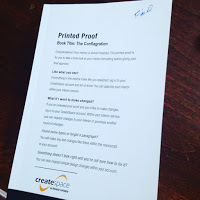 The Final Print Proof of The ConflagrationMany people have asked why I made The Awakening a four-book series. I asked myself the same question yesterday after I approved the final print proof for The Conflagration, Book 3 in the series, and revised my handwritten outline for Book 4, The Illumination. (You can get The Conflagration now in ebook form if you don't want to wait for the paperback.) It's not that I don't love my main character, Tara Spencer. Despite all the awful events I've put her through, I do. She and her allies and foes are my favorite characters of all those I've written about. But if I had made the series a trilogy, I'd be finished now. I'd miss them all. But I'd be finished. As someone who likes to check off boxes for completed tasks on lists, that appeals to me.
The Final Print Proof of The ConflagrationMany people have asked why I made The Awakening a four-book series. I asked myself the same question yesterday after I approved the final print proof for The Conflagration, Book 3 in the series, and revised my handwritten outline for Book 4, The Illumination. (You can get The Conflagration now in ebook form if you don't want to wait for the paperback.) It's not that I don't love my main character, Tara Spencer. Despite all the awful events I've put her through, I do. She and her allies and foes are my favorite characters of all those I've written about. But if I had made the series a trilogy, I'd be finished now. I'd miss them all. But I'd be finished. As someone who likes to check off boxes for completed tasks on lists, that appeals to me.So why write four books? As I talked about in the Author's Note at the end of The Conflagration, originally I envisioned The Awakening as a standalone novel. But as I revised it before publishing, I realized there was much more to Tara's story. I've always been intrigued by world-changing pregnancy narratives, Rosemary's Baby and The Terminator being my favorites. On the one hand, that trope gave us one of our most well known female action heroes in The Terminator. On the other, that narrative seems to say the woman protagonist derives her significance from the fact that she may give birth to a special child, and that it's only acceptable for her be proactive, to fight, if it's to protect her child. That's not the story I felt compelled to tell.
 Outline for The Illumination, the fourth (and last) book in The Awakening SeriesTara is a hero not because of the child she might have but because of the values she holds and who she is, so her story goes far beyond having to deal with a pregnancy that was forced upon her. I also wanted to deal with the issue of the forced pregnancy itself. As in, regardless of end goals or motives, what are the ethics of causing a supernatural or mystical pregnancy for a woman who had no part in the plan? As I plotted The Unbelievers (Book 2), I discovered it took me to a natural midpoint both for Tara's personal journey and for the bigger picture of how and why she came to be pregnant and what it means for the world. So -- four books.
Outline for The Illumination, the fourth (and last) book in The Awakening SeriesTara is a hero not because of the child she might have but because of the values she holds and who she is, so her story goes far beyond having to deal with a pregnancy that was forced upon her. I also wanted to deal with the issue of the forced pregnancy itself. As in, regardless of end goals or motives, what are the ethics of causing a supernatural or mystical pregnancy for a woman who had no part in the plan? As I plotted The Unbelievers (Book 2), I discovered it took me to a natural midpoint both for Tara's personal journey and for the bigger picture of how and why she came to be pregnant and what it means for the world. So -- four books.My goal is to release Book 4, The Illumination, within a year. If you've enjoyed The Awakening Series to date and would like to be notified of the release of The Illumination, you can join my email list here.
Published on May 25, 2016 08:15
May 11, 2016
Now Available For Preorder: Book 3 In The Awakening Series
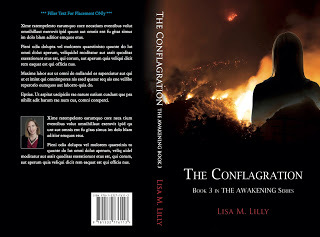
Six months after giving birth to a mysterious child whispered to be the Antichrist, Tara Spencer fights for her life as she searches for her kidnapped baby girl.
While Tara follows leads, she also must struggle to make sense of a shocking prophecy about her own growing power and place in the battle between good and evil.
Denounced by some as a fraud and feared by others, Tara desperately aligns herself with foes who attempted to murder her only days ago. But can she come to terms with what she's learned about herself and control her power in time to save her daughter?
The Conflagration is the third installment in the four-book Awakening series by Lisa M. Lilly, author of The Awakening and The Unbelievers. She lives and practices law in Chicago.
Release date: May 17, 2016 for all ebook editions
Preorder Now:
Kindle
iBook
Kobo
Published on May 11, 2016 18:20
May 5, 2016
Lost Gospels From the Fourth Century
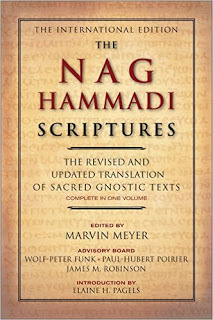 If you've never heard of the Nag Hammadi documents, think Dead Sea Scrolls but less well known. The Nag Hammadi Scriptures contain English-language translations of fourth-century papyrus gospels unearthed in Egypt in 1945. I relied on an earlier compilation of the translations in my research for The Awakening series.
If you've never heard of the Nag Hammadi documents, think Dead Sea Scrolls but less well known. The Nag Hammadi Scriptures contain English-language translations of fourth-century papyrus gospels unearthed in Egypt in 1945. I relied on an earlier compilation of the translations in my research for The Awakening series. Inside, you'll find many lost texts the official Catholic Church rejected, including the Gospel of Mary, the Apocalypse of Adam (where Adam speaks to his son Seth), the Gospel of Judas, the Gospel of Thomas, and two I used in the Awakening series, The Trimorphic Protennoia and The Thunder, Perfect Mind. (You'll see reference to the latter in Book 3, The Conflagration, which will be released May 17, 2017.) Both of those texts are poetic and both lend themselves to a focus on the feminine aspects of God. I liked reading them because they interested me even if I hadn't been looking for inspiration for my fiction.
Other texts I found hard to follow, and still others seemed so out of whack (that's a technical term) to my modern-day eyes that I wasn't surprised the Church disregarded them. Whether they made sense at the time and were rejected as contrary to official Church teachings, I don't know.
This edition in particular of the Nag Hammadi Scriptures makes me cheer for Amazon and other platforms for selling books on line. When I first learned about these manuscripts, the compilation of translated versions was only available through academic publishers at a cost of over $700. Later, I bought the edition I still have through Amazon for about $60. As I write this, the price is $12.99 for Kindle and $15.48 for paperback, with many used copies available for less.
If you are interested in the origins of Christianity and how and why some of the earliest texts were excluded from it, this is well worth the read.
Published on May 05, 2016 10:04
April 27, 2016
The Literary Equivalent Of Pratfalls
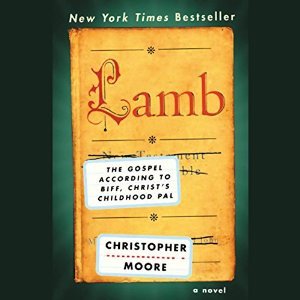 Lamb is the latest book group read.One of the pluses and minuses of belonging to two book groups is that I read a lot of books I wouldn't otherwise choose. Lamb: The Gospel According to Biff, Christ's Childhood Pal is one of them. Not only does it not fall into the mystery, occult (OK-maybe extremely loosely), suspense, or thriller genres, it is a novel that is mostly satire mixed with the literary equivalent of pratfalls. I enjoy short satirical pieces and goofy humor at times. But not so much for fifteen hours and twenty minutes, which is the length of this book on Audible.
Lamb is the latest book group read.One of the pluses and minuses of belonging to two book groups is that I read a lot of books I wouldn't otherwise choose. Lamb: The Gospel According to Biff, Christ's Childhood Pal is one of them. Not only does it not fall into the mystery, occult (OK-maybe extremely loosely), suspense, or thriller genres, it is a novel that is mostly satire mixed with the literary equivalent of pratfalls. I enjoy short satirical pieces and goofy humor at times. But not so much for fifteen hours and twenty minutes, which is the length of this book on Audible.Despite all that, I'm not sorry I read Lamb. Mainly told in first person, it purports to be a lost gospel of a childhood friend of Jesus Christ, wrapped within the story of how Biff came to write it after being resurrected by an annoying angel. It focuses on the years the Christian New Testament skips. First, it covers childhood and, second, the early teens to twenty-something. According to Biff, these years include travel in India, learning about other religions, doubts about being a messiah and what that means, and a healthy/borderline unhealthy curiosity about sex.
More Than A Comedy
Lamb is filled with irreverent jokes, anachronisms, and silliness, but it would be a mistake to view it as making fun of the Christian gospels. OK, it does make fun of the Christian gospels a little. But I read the book as the author’s genuine attempt to understand inconsistencies, gaps, and less-than-clear doctrines expressed by the Christ depicted in the New Testament. For that reason, depending upon whether the reader's sense of humor matches the author’s, I don't think this book will necessarily put off religious readers.
But It's Probably Not Horror
The Amazon rankings for Lamb as I write this include listings under (a) horror/comedy, (b) contemporary fiction/religious, and (c) religious and inspirational/historical. Uh, I'm not so sure. I didn't find anything that would be remotely considered horror in this book. But the Amazon categories, despite including numerous subcategories, often do not quite fit a particular read. My own Awakening series, best described as a supernatural thriller series, usually appears on the Horror Top 100 list when I have a sale, though it is more supernatural than frightening or bone chilling.
As to the historical reference, my guess is people who view the Bible itself as historical would be offended at anyone referring to Lamb that way. On the other hand, I saw a Goodreads review that noted that some of the fictional adventures Joshua (the name Biff claims was Jesus Christ's real name) engages in fit with historical suppositions about those missing years.
Why Listen Rather Than Read
Had I read Lamb rather than listened to it, I might have liked it better. The joke is a bit one-note, and listening to it for so many hours got tiresome. Had I been reading, it would have taken me less time, so I might not have grown tired of it. I also might have skimmed a few more parts. (Though I confess I did the audio equivalent of skimming. I set the reading speed faster and occasionally did household tasks that drowned out the narration without going back to listen to the parts I missed.) I chose to listen rather than read because I knew this wasn't my type of book. I figured I'd be more apt to finish it if I listened while doing other things rather than setting aside time simply to read. Also, I wanted to use my Audible subscription credits.
Conflicting Reviews Of Lamb
Unlike Americanah, which I discussed two weeks ago, I was not surprised by the varying reviews of Lamb. Those people who enjoy satire and farce seemed to really love the book. Those who gave it very low reviews tended to be people who, like me, grew tired of the novel-length joke or aren't really fans of satire or farce. If you're not sure if this book will work for you, I suggest listening to a sample on Audible or reading the sample pages on Amazon. If you enjoy the tone, you probably will like the rest of the book as well. If not, I doubt that it will grow on you.
Why Would I Review Another Book That Is Not What I Usually Like To Read?
From a marketing perspective, I probably should review books here that are in the same genre in which I write. That way, people might flip from the blog page on my website to the book page and discover they are interested in my Awakening series. But I already edit a monthly newsletter that covers the mystery, occult, suspense, and thriller genres in books, film, and TV. (You can sign up here if interested.)
More important, as both a reader and writer, I want to pay attention to books that are outside my usual area. For one thing, too many dark books leads to a skewed view of the world. I already look at every alley or panel van and imagine a story involving a monster or other villain. That’s good for my career as an author, but I don’t need to reinforce it with every book I pick up. And I have always liked learning about perspectives and approaches different from my own. Which has resulted in some very interesting conversations with different friends during this election cycle, but that's a whole other post. Lamb gave me some new perspectives on how believers see Christ and on using satire in long-form storytelling. That alone made it worth the read.
Published on April 27, 2016 12:18
April 20, 2016
God Is Not One
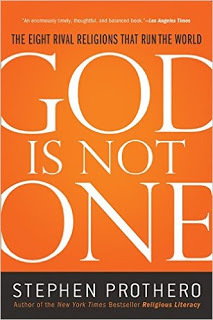 This week's book recommendation.Since my early twenties when I started seriously questioning my religious beliefs, I've enjoyed reading books about religion. Not books that preach, but books that explore. Questions about when and how the universe was created, whether there is a god, many gods, or no god, and the various ways people rely upon religion to explain and navigate the world fascinate me, as does how religious beliefs affect people's relationships. That last point inspired me to write my Awakening thriller series, where characters with genuine, deeply-held beliefs oppose one another. All of which is why I love the book God Is Not One: The Eight Rival Religions That Run The World by Stephen Prothero.
This week's book recommendation.Since my early twenties when I started seriously questioning my religious beliefs, I've enjoyed reading books about religion. Not books that preach, but books that explore. Questions about when and how the universe was created, whether there is a god, many gods, or no god, and the various ways people rely upon religion to explain and navigate the world fascinate me, as does how religious beliefs affect people's relationships. That last point inspired me to write my Awakening thriller series, where characters with genuine, deeply-held beliefs oppose one another. All of which is why I love the book God Is Not One: The Eight Rival Religions That Run The World by Stephen Prothero.Prothero's Reasons For Writing About Differences In Religious Beliefs
Prothero's premise is that while people often say things like "we all worship the same God," we actually "...live in a world where religion seems as likely to detonate a bomb as to defuse one." (See Prothero's Introduction.) No one tries to argue that every political party, type of government, or economic system is the same, as the current U.S. presidential primary races highlight. Yet popular culture and even religious scholars often view different religious as merely varying ways to get to the same place.
The Eight Religions The Book Discusses
Throughout God Is Not One, Prothero shows the differences among Islam, Christianity, Confucianism, Hinduism, Buddhism, Yoruba Religion, Judaism, and Daoism. Why these and not others are included in itself raises interesting questions. Prothero organizes his analysis using a four-point structure. For each religion, he examines:
the problemthe solution (or religious goal)the technique (for reaching/achieving the solution)an exemplar who illustrates the path from problem to solution
A Timely Example Of Differences
As an example of differences in the first two points, Prothero explains how Christianity sees the problem as sin, with salvation as the solution. But in Buddhism, suffering is the problem and awakening is the solution. In contrast to both of those religions, in Judaism, the problem is exile; the solution is returning to God. I find these comparisons particularly timely for the U.S., which is now in the midst of the presidential primary election season. The race includes candidates who normally court the vote of a specific segment of the Christian population, argue the U.S. is a Christian nation, and deplore businesses who attempt to recognize that not all their customers are Christian. Yet because the primaries are hotly contested this year in New York, those same candidates have needed to attempt to broaden their appeal to non-Christian voters. I confess to not following every single thing politicians say (shocking, I know), but I feel safe in guessing that one way politicians attempt to deal with such conundrums is to assert that we all worship the same God and hold the same values.
Who Shouldn't Read This Book
If you're uninterested in religion or philosophy, God Is Not One won't appeal to you. But if you are curious about what, how, and why cultures and individuals profess certain religious beliefs, I think you'll find this fascinating. Also, while the book is well-researched, the tone is fairly conversation, so you won't feel like you're reading a textbook.
If you read God Is Not One and have thoughts about it or can suggest other similar books, please share below.
Published on April 20, 2016 12:20
April 13, 2016
It Was The Best Of Books, It Was The Worst Of Books: Americanah
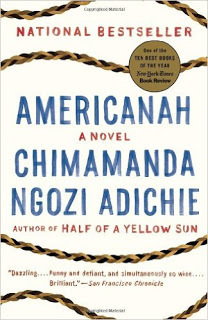
Why I Read Americanah
Suspense, thrillers, mystery, and occult are the genres that make up most of my to-read stack, so Americanah by Chimamanda Ngozi Adichie is not the type of novel that typically catches my eye. But I saw it listed in an article covering the ten most-talked-about books for 2014 and suggested it for one of my book groups. Also, I loved the audiobook sample on Audible. It was from the point of view of Ifemelu, a Nigerian woman who moves to the U.S., struggles to achieve professional success, and writes a blog on race for non-American blacks. I found the partial blog post included in the sample funny and insightful. I was also intrigued that Ifemelu planned to return to Nigeria and was contacting Obinze, a Nigerian man whom she'd once loved, but who was now married to someone else.
The book, which I listened to rather than read, shifts between Ifemelu and Obinze, who at one point emigrates to England but does so without documentation. (Ifemelu comes to the U.S. on a visa.) There are also shifts in time. While Americanah starts when Ifemelu decides to move back to Nigeria, much of the book is the story of her life leading up to that point.
The Best Of Books
Though I usually prefer a more traditional plot structure, I loved this book. I had no trouble following the point of view and time shifts, which is partly a testament to the narrator. She varied her accent and voice slightly for each character so that I could tell who was whom, but never to the point of caricature. I also found it fairly easy to follow the shifts in time, as the author used certain anchor scenes and places to signal the timeframe. The characters struck a chord in me and were well developed. I loved Ifemelu's observations on race and U.S. culture from her outsider perspective and enjoyed her wit and humor. At the same time, her story is deeply emotional, as is Obinze's. The book has a great deal to say about race, immigration, and differences from person to person and country to country, but I never felt it spoke at the expense of the characters or the plot.
The Worst Of Books?
So why does my title include "the worst of books"? Because after I'd finished I checked the reviews on Goodreads. To my surprise, the first review that popped up was from a reader who hated everything about the book that I'd loved. He'd found the characters underdeveloped, the plot hard to follow or non-existent, the structure lacking. Another reviewer found the book preachy and not at all funny, and the scenes that made me cry left her cold.
You Decide
None of the negative reviews changed my view of Americanah as one of the best books I've ever read. But the unfavorable reactions were educational. As both a reader and writer, I know book lovers often differ widely in how they see a particular novel. This is particularly so when it comes to a fan of literary fiction reading commercial work and vice versa. This difference often occurs because people come to novels for different things. The lovers of literary fiction tend to focus more on the writing as an end in itself, while those who love commercial fiction often look more for story, including plot and characterization. But I hadn't realized how much of a difference of opinion there could be on a book that seemed to me to do an amazing job on both counts.
If you decide to read the Americanah, please let me know how you see it.
Published on April 13, 2016 14:04
Why I Read AmericanahSuspense, thrillers, mystery, and oc...

Why I Read Americanah
Suspense, thrillers, mystery, and occult are the genres that make up most of my to-read stack, so Americanah by Chimamanda Ngozi Adichie is not the type of novel that typically catches my eye. But I saw it listed in an article covering the ten most-talked-about books for 2014 and suggested it for one of my book groups. Also, I loved the audiobook sample on Audible. It was from the point of view of Ifemelu, a Nigerian woman who moves to the U.S., struggles to achieve professional success, and writes a blog on race for non-American blacks. I found the partial blog post included in the sample funny and insightful. I was also intrigued that Ifemelu planned to return to Nigeria and was contacting Obinze, a Nigerian man whom she'd once loved, but who was now married to someone else.
The book, which I listened to rather than read, shifts between Ifemelu and Obinze, who at one point emigrates to England but does so without documentation. (Ifemelu comes to the U.S. on a visa.) There are also shifts in time. While Americanah starts when Ifemelu decides to move back to Nigeria, much of the book is the story of her life leading up to that point.
The Best Of Books
Though I usually prefer a more traditional plot structure, I loved this book. I had no trouble following the point of view and time shifts, which is partly a testament to the narrator. She varied her accent and voice slightly for each character so that I could tell who was whom, but never to the point of caricature. I also found it fairly easy to follow the shifts in time, as the author used certain anchor scenes and places to signal the timeframe. The characters struck a chord in me and were well developed. I loved Ifemelu's observations on race and U.S. culture from her outsider perspective and enjoyed her wit and humor. At the same time, her story is deeply emotional, as is Obinze's. The book has a great deal to say about race, immigration, and differences from person to person and country to country, but I never felt it spoke at the expense of the characters or the plot.
The Worst Of Books?
So why does my title include "the worst of books"? Because after I'd finished I checked the reviews on Goodreads. To my surprise, the first review that popped up was from a reader who hated everything about the book that I'd loved. He'd found the characters underdeveloped, the plot hard to follow or non-existent, the structure lacking. Another reviewer found the book preachy and not at all funny, and the scenes that made me cry left her cold.
You Decide
None of the negative reviews changed my view of Americanah as one of the best books I've ever read. But the unfavorable reactions were educational. As both a reader and writer, I know book lovers often differ widely in how they see a particular novel. This is particularly so when it comes to a fan of literary fiction reading commercial work and vice versa. This difference often occurs because people come to novels for different things. The lovers of literary fiction tend to focus more on the writing as an end in itself, while those who love commercial fiction often look more for story, including plot and characterization. But I hadn't realized how much of a difference of opinion there could be on a book that seemed to me to do an amazing job on both counts.
If you decide to read the Americanah, please let me know how you see it.
Published on April 13, 2016 14:04
April 6, 2016
The Conflagration Is Almost Here
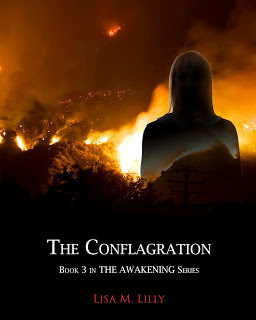
It's almost time for Book 3 of 4 in The Awakening series. I'm finalizing the text now for publication, and you can see the cover above, thanks to graphic designer Carly Neigh. The ebook editions will be released in May. If you'd like to receive a notice of the release date directly, you can join my email list here.
Now, back to work...
Published on April 06, 2016 19:31
March 23, 2016
Still Life and Still Life (A Favorite Books Post)
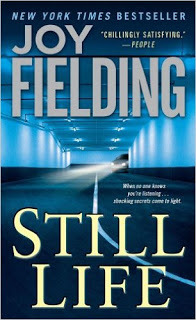 From personal experience, I know authors struggle with what to title their books. The goal is to give readers a sense of what the book is about and to choose something memorable, but not so memorable it gets used too often, possibly creating confusion when the reader searches for the book. (In the U.S., titles are not copyrightable, so any number of authors and publishers can use the same title.) Two of my favorite thrillers have the same title: Still Life.
From personal experience, I know authors struggle with what to title their books. The goal is to give readers a sense of what the book is about and to choose something memorable, but not so memorable it gets used too often, possibly creating confusion when the reader searches for the book. (In the U.S., titles are not copyrightable, so any number of authors and publishers can use the same title.) Two of my favorite thrillers have the same title: Still Life.Still Life by Joy Fielding
Casey Marshall is a businesswoman who suffers severe injuries from being hit by a car. She's plunged into a coma, but she gradually becomes aware of what's happening around her. She can hear, at least some of the time, but can't move, see, or communicate. Despite that, Fielding makes her a proactive main character who does everything she can within the (significant) limits placed upon her. I found every moment fascinating as Casey begins to realize the people she loves might not be quite who she thought they were, and the "accident" may have been an attempt on her life.
Still Life by Louise Penny
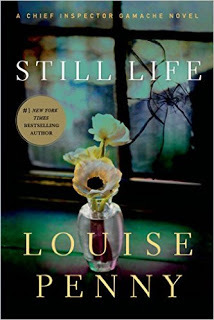
Like Joy Fielding's book, I couldn't put this one down. It is a more traditional suspense novel in that there is a detective--Chief Inspector Gamache. Yet it is distinctive in several ways. While Casey exists almost in a vacuum due to her coma, the mystery here is grounded in Three Pines, a small town in Canada that almost becomes a character in itself. The residents include an accomplished aging poet, several artists, a former psychologist turned bookstore owner, and proprietors of a beautiful bistro that is also an antique shop. The murder victim is a beloved long-time resident of the town, murdered just after she's been brave enough at last to enter a painting in an art show and has learned she's been accepted. She has no enemies that anyone's aware of, and no one can imagine who would kill her.
Point of View
Joy Fielding's book is told from a single point of view, that of Casey Marshall. The reader knows only what Casey hears and understands. Louise Penny's novel is told from multiple points of view, sometimes within the same scene, which at first I found a bit distracting. In the end, though, seeing the town, the crime, and the resolution from so many viewpoints added layers to the story. It also added to my desire to live in Three Pines, or at least visit regularly.
The Meaning of the Title
The most obvious meaning of the title of the Joy Fielding book is that the protagonist is literally still, due to her coma, and yet is more alive than anyone realizes. Still Life also reflects some of Casey's realizations about her pre-coma life.
In the Louise Penny book, the title in part refers to the artists in the town and their work. But it also reflects aspects of life in the town in ways that shed light on the mystery.
Tone and Title
Still Life by Joy Fielding is tense and suspenseful, with little relief from Casey's fear. Still Life by Louis Penny has a mixed tone. Despite beginning in an atmosphere somewhat like that of a cozy mystery, the people and events have dark sides and twists. A few times I found the humor a bit buffoonish given the darkness of the story as a whole; however, I enjoyed the book so much it didn't matter.
If you enjoy suspense or mysteries, I highly recommend both Still Lifes. They are among my favorite thrillers of all time.
Published on March 23, 2016 15:32
March 16, 2016
Inside The United States States Supreme Court: The Brethren (A Favorite Books Post)
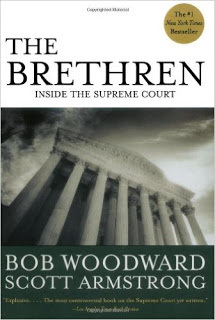 Current cover for The Brethren.The Brethren is a behind-the-scenes study of the people on the United States Supreme Court during a time when landmark decisions, including Roe v. Wade, where issued. I came across it while in law school, when I told a friend I didn't understand how the Court could issue such conflicting opinions during the same time period. I often felt some underlying reason for a decision was being left unspoken. He loaned me The Brethren by Bob Woodward and Scott Armstrong.
Current cover for The Brethren.The Brethren is a behind-the-scenes study of the people on the United States Supreme Court during a time when landmark decisions, including Roe v. Wade, where issued. I came across it while in law school, when I told a friend I didn't understand how the Court could issue such conflicting opinions during the same time period. I often felt some underlying reason for a decision was being left unspoken. He loaned me The Brethren by Bob Woodward and Scott Armstrong.Not Like Other History Or Political BooksThe idea of reading another book did not appeal to me. I was working full-time, attending classes at night, and reading at least eight hours every Saturday and eight hours every Sunday to keep up with the required reading. While before I started law school, my favorite thing to do to relax was to read novels, after wading through dense, difficult case law for sixteen-twenty hours a week, I generally turned on the TV when I had a rare half hour with nothing to do. (That's how I started watching X-Files, which was on after my Friday night class.) I also had never liked any history book I’d ever read, probably because I’d only read textbooks.
So if my classmate hadn't actually handed me the paperback edition of The Brethren (cover shown below), I doubt I would have read it. But I started it and was immediately hooked, flying through it within a week despite all my other commitments. It became the first nonfiction book I loved. I had never read a Bob Woodward book before, so I didn't know what it would be like. (I’ve now read and enjoyed several, but this one is my favorite.) I was fascinated by the horse-trading, personal relationships, and thought processes behind the Court's decisions.
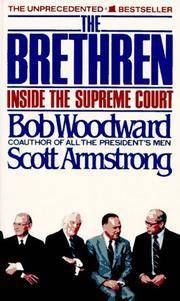 Avon Books cover for The BrethrenWhen Only White Men Were On The CourtI had an added personal interest in the book because the only other lawyer in my extended family clerked at the U.S. Supreme Court toward the end of the time period of the book—1969-1975. It was a time when only white men served on the Court, and it's interesting to see how their views and politics varied despite all having that in common. (You can see a list of all Supreme Court justices throughout history here.)
Avon Books cover for The BrethrenWhen Only White Men Were On The CourtI had an added personal interest in the book because the only other lawyer in my extended family clerked at the U.S. Supreme Court toward the end of the time period of the book—1969-1975. It was a time when only white men served on the Court, and it's interesting to see how their views and politics varied despite all having that in common. (You can see a list of all Supreme Court justices throughout history here.)My cousin told me Bob Woodward called him when researching the book, but he declined to comment, as clerks are supposed to keep everything confidential. While I'm glad my cousin honored that, I confess I'm grateful that others apparently did not, because the book is fascinating to read for the human stories alone. It also helped me understand the extremely varied reasons why the justices reach their decisions and how the Court fits into the larger political system of my country. I highly recommend The Brethren to anyone who has even a passing interest in how the United States works.
Published on March 16, 2016 07:13



